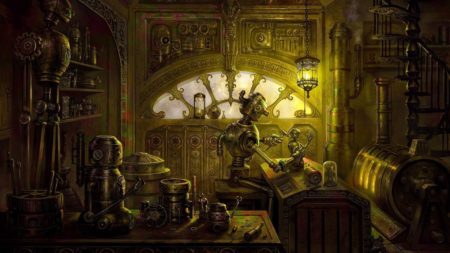ICFA 39 “Frankenstein Bicentennial”
200 Years of the Fantastic: Celebrating Frankenstein and Mary Shelley
The Thirty-Ninth International Conference on the Fantastic in the Arts
March 14-18, 2018
Orlando Airport Marriott Lakeside, Orlando, Florida, USA
Guests of Honor: John Kessel and Nike Sulway
Guest Scholar: Fred Botting
Dear IAFA members and past ICFA attendees,
As the Thirty-Ninth International Conference on the Fantastic in the Arts nears, I wanted to send out a few reminders.
IF YOU HAVEN’T ALREADY, PLEASE SIGN UP
(The website is being updated. Please bear with us during this transition!)
We are now in Late Registration.
First, you must be a member to present a paper or sit on a panel. If you haven’t already, renew here: https://iaftfita.wildapricot.org/JoinUs
Next, if you haven’t already done so, you can register for the conference here: https://iaftfita.wildapricot.org/page-1609929
Holders of joint memberships must register for the conference individually.
The conference hotel (Orlando Airport Marriott Lakeside) is SOLD OUT. We have arranged overflow accommodations at the Sheraton Suites Orlando Airport, a short walk from the Marriott. The room rate is $165 plus tax, which is higher than the Marriott but less than the rack rate. YOU MUST BOOK NOW if you wish to secure a room. The Sheraton will only hold the rooms open and at this rate until February 12. Use this link to book: rooms: https://www.starwoodmeeting.com/Book/IAFA
Please contact Jeri Zulli (jerzulli AT live.com) with hotel questions.
Also, if you had a paper accepted but you know you cannot attend, please let your Division Head know as soon as you can, so we can remove you from the program. If you have to withdraw, be sure to cancel any hotel reservations you may have made.
A list of all fees associated with the conference can be found here: https://www.fantastic-arts.org/wp-content/uploads/2017/11/ICFA-39-price-summary.pdf
SWAG AND MEAL TICKETS
If you have not yet registered, swag and meal tickets may be purchased as part of your registration.
If you have already registered but suddenly have become alive to the fact that you require a meal ticket, T-shirt, or tote, you may purchase them at the IAFA Store: https://store4277080.ecwid.com/
Swag and meal tickets will be available at the Registration desk, but at higher rates, and on a first-come, first-served basis.
IMPORTANT DATES
Dates are reckoned by local time in Orlando, Florida.
We are currently in late registration. Registration blackout begins on February 22, 2018. On and after this day, the online system will be closed so the conference committee can commit to the hotel for space and meal requirements. The system will open again for on-site registration on March 14, 2018.
No refunds will be given after February 1, 2018. Exceptions may be appealed to the Board.
NETWORKING AND VOLUNTEERING
Student Caucus (SCIAFA) and Mentoring Program
The purpose of the Student Caucus (SCIAFA) is to foster and promote growth, scholarship, and fellowship among the student members of the IAFA and to address the needs of students working in the field of the fantastic, by establishing mentoring and other programs, through coordinating efforts with the main body of the IAFA. If you are a student member of the IAFA, you are automatically a member of SCIAFA.
The mentoring program is an important part of the SCIAFA. Since 2001, the IAFA Student Caucus (SCIAFA) has sponsored a Mentoring Program aimed at helping student scholars to find their way around ICFA, discover the natural friendliness of the conference as quickly as possible, use ICFA as an entrance into existing scholarly communities concerned with the fantastic, and leave with both fond memories of the supporting organization and plans to return. This year, the SCIAFA is still accepting participants for the Mentoring Program, and we are in great need of mentors, so please consider signing up. For more information about the Mentoring Program, or to sign up as either a mentor or mentee, please contact Amanda Rudd (rudd.am AT gmail.com).
Volunteering
The Registration and AV areas always welcome volunteer help; interested folks can sign up here: https://docs.google.com/forms/d/e/1FAIpQLSes6BC2i4kjxNwszLk28julqDsm8Tx-cUxANkyTGkFffOEFfw/viewform
IAFA Bucks at the fabulous new rate of $10 an hour will be provided. These may be used for swag and meal tickets at this year’s convention, or they may be held and put toward next year’s registration. IAFA Bucks may not be used for this year’s registration, and they may not be used in the Book Room, which is financially independent.
Discussion List and Social Media
IAFA Listserv: http://lists.iafa.org/listinfo.cgi/iafa-l-iafa.org
IAFA on Facebook: https://www.facebook.com/FantasticArts/?fref=ts
IAFA on Twitter: https://twitter.com/iafa_tw?lang=en
Student Caucus (SCIAFA) on Facebook: https://www.facebook.com/groups/833849033305627/
If you have any questions or need any help with membership renewal or registration, please email me. We look forward to seeing you in March!
Karen Hellekson
IAFA Membership Registrar
iafareg AT gmail.com
